The Wheels of Industry.
Page 12
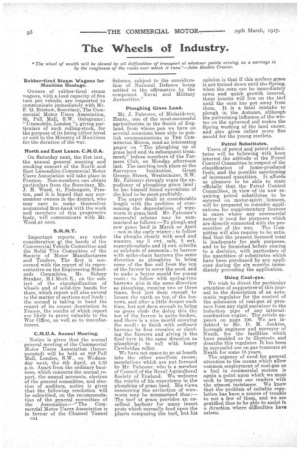
Page 13
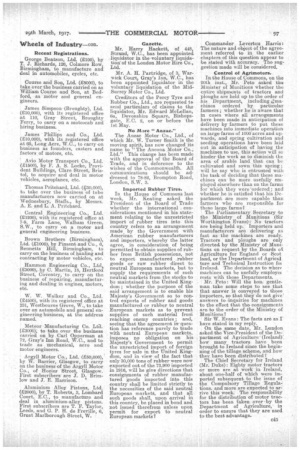
Page 14
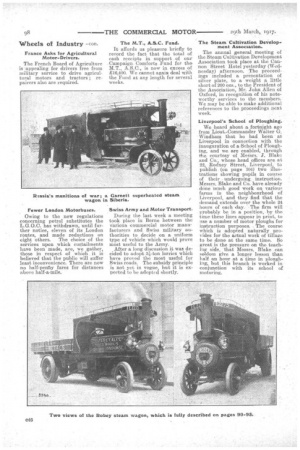
Page 16
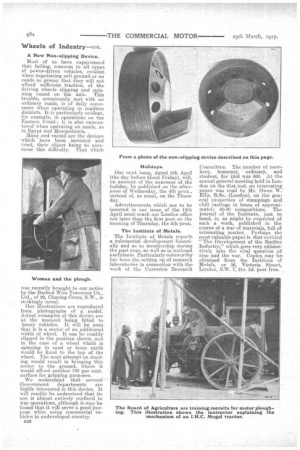
Page 17
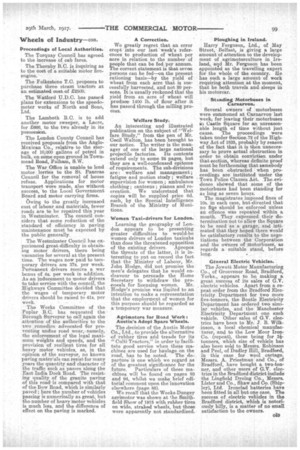
If you've noticed an error in this article please click here to report it so we can fix it.
"The wheel of wealth will be slowed by all difficulties of transport at whatever points an sing, as a carriage is by the roughness of the roads over which it runs."—John Beattie Crozier.
Rubber-tired Steam Wagons for Munition Haulage.
Owners of rubber-tired steam wagons, with.a load capacity of five tons per vehicle, are requested to communicate immediately with Mr. F. G. Bristow, Secretary, The Commercial Motor Users Association, 83, Pall Mall, S.W. (telegrams : " Usamobile, London "), giving particulars of such rolling-stock, for the purpose of its being either hired or sold to the Ministry of Munitions for the duration of the war.
North and East Lancs. C.M.U.A.
On Saturday next, the 31st inst., the annual general meeting and smoking concert of the North and East Lancashire_Commercial Motor Users Association will take place in Preston. Non-members can obtain particulars from the Secretary, Mr. J. H. Ward, 41, Fishergate, Preston, and it is hoped that any nonmember owners in the district, who may care to make themselves acquainted first-hand with the work and members of this progressive body, will communicate with Mr. Ward at once.
S.M.M.T.
Important reports are under consideration et the hands of the Commercial Vehicle Committee and the Solid Tire Committee of the Society of Motor Manufacturers and Traders. The first is concerned with the report of its representative on the Engineering Standards Committee, Mr. Sidney Straker, M.I.Mech.E., on the subject of the standardization of wheels and of solid-tire bands for them, which report will also extend to the matter of sections and loads ; the second is taking in hand the report of its recent deputation to France, the results of which report are likely to prove valuable to the War Office, as well as to manufacturers.
C.M.U.A. Annual meeting.
Notice is given that the annual general meeting of the Commercial Motor Users Association (Incorporated) will be held at 83e Pall Mall, London, S.W., on Wednesday next, the 4th April, at 3.30 p.m. Apart from the ordinary business, which concerns the annual report, the annual accounts, election of the general committee, and election of auditors, notice is given that the following resolution will be submitted, on the recommendation of the general committee of the Association :—" The Commercial Motor Users Association is in favour of the Channel Tunnel c44 Scheme, subject to the considerae tion of National Defence being settled in the affirmative by the competent Naval and Military Authorities."
Ploughing Grass Land.
Mr. J. Falconer, of Micheidev-er, Hants.. one of the most-successful agriculturists in the South of England, from whose pen we have on several occasions been able to publish communications in THE COMMERCIAL MOTOR, read an interesting paper on "The ploughing up of grass land and its subsequent treatment," before members of the Farmers Club, on Monday afternoon last. The meeting took place at the Surveyors Institution, Great George Street, Westminster, S.W. Mr. Falconer strongly urges the expediency of ploughing grass land ; he has himself found operations of the kind to be most profitable.
The paper dealt at considerablo length with the problem of overcoming the depredations of wireworm in grass land. Mr. Falconer's successful scheme may be summarized as follows :—To plough and sow grass land in March or April —not in the early winter ; to follow the ploughs closely with seed and manure, say 3 cwt. salt, 3 cwt. superphosphate. and 11 cwt. nitrolin or sulphate of ammonia ; to harrow with spike-chain harrows the, same direction as ploughing to bring seine of the fine soil from the top of the furrow to cover the seed, and to make a better mould for young roots ; to follow with .spring-tyne harrows also in the same direction as ploughing, running two or three times, first just deep enough to loosen the earth on top of the furrows, and after a little deeper each time, but not deep enough to bring up grass clods (by doing this the ton of the furrow is quite broken, and there is a nice mould covering the seed. ) • to finish with ordinary harrows by first crossing or slanting the furrows and giving it the final turn in the same direction as ploughing.; to roll with heavy Cambridge roller.
We have not space to go at length into the other excellent rec-mmmendations which are put forward by Mr. Falconer. who is a member of Council of the Royal Agricultural Society of England. We welcome the results of his experience in the ploughing of grass land. His views concerning the. extinction of wireworm may be summarized thus :The turf of grass provides an excellent harbour for many insect pests which normally feed upon the plants composing the turf, but his
opinion is that if this surface grass 'is not turned down until the Spring, when the corn can be immediately sown and quick growth insured, these insects will live on the turf until the corn has got away from them. It is a fatal mistake to plough in the Autumn, although the pulverising influence of the winter on the upturned soil makes the Spring working of the land easier, and also gives rather more fine mould for the young rootlets.
Petrol Substitutes.
Users of petrol and petrol substitutes will be following with keen interest the attitude of the Petrol Control Committee in respect of the classification of home-produced fuels, and the possible sanctioning of increased quantities. It affords us pleasure to be able to state officially that the Petrol Control Committee, in view of its now requiring petrol substitutes to be entered on motor-spirit licences, will be prepared to consider applications for supplementary licences in cases where any commercial motor is -used for purposes which are directly connected with the prosecution of the war. The Committee will also require to be satisfied that the present licensed total is inadequate for sueh purposes, and to be furnished before coming to a decision, with particulars of the quantities of substitutes which have been purchased by any applicant during the six months immediately preceding the application.
Using Coal-gas.
We wish to direct the particular attention of supporters-of this journal to the description of an automatic regulator for the eontrol of the admission of coal-gas at pressure from any rigid container to the induction pipe of any internalcombustion engine. The article appears on page 100. We are indebted to Mr. D. M. Jenkins, borough engineer and surveyor of Neath, for the facilities which have enabled us to illustrate and describe this regulator. It has been in successful use on gas tramcars at Neath for some 18 years.
The urgency of need for general attention to the means which allow common employment of coal-gas as a fuel in commercial motors is again a point upon which we must seek to impress our readers with the utmost insistance. We know that the problem of suitable regulation has been a source of trouble to not a few of them, and we are gratified thus to be able to assist in a direction where difficulties have arisen. Recent Registrations.
George Beatson, Ltd. (ZOO), by T. J. Richards, 126, Colmore Row, Birmingham, to manufacture and deal in automobiles, cycles, etc.
Course and Son, Ltd. (i8000), to take over the business carried on as William Course and Son, at Bedford, as motor and general engineers.
James Simpson -(Brouglity), Ltd. (E10,000), with its registered office at 110, Gray Street, Broughty Ferry, to carry on a mote-nab and hiring business.
James Phillips and Co., Ltd. (E10,000), with its registered office at 05, Long Acre, W.C., to carry on business as founders, casters and factors of motors, etc.
Avio Motor Transport Co., Ltd. • (11500), by F. A. S. Locke, Provident Buildings, Clare Street, Bristol, to acquire and deal in motor vehicles, aeroplanes, etc.
Thomas Pritchard, Ltd. (30,000), to take over the business of tube • manufacturers now carried on at Wednesbury, Staffs., by Messrs. A. E. and L. A. Pritchard.
Central Engineering Co., Ltd. (21200), with its registered oifiee at 7-9, Farm Lane, AValhain Green, S.W., to carry on a motor and general engineering business.
Brown Brothers (Birmingham), Ltd. (£1000), by Pinsent and Co., 6, Bennetts Hill, Birmingham, to carry on the business of hauling and contracting by motor vehicles, etc.
Hammon Engineering Co., Lids (E3000), by C. Martin, 18, Hertford. Street, Coventry, to carry on the business of repairing, manufacturing and dealing in engines, motors, etc.
W. W. Walker and Co., Ltd. (24500), with its registered office at 231, Westbourne Grove, W., to take over an automobile and general engineering business, at the address named.
Meteor Manufacturing Co. Lta. (23000), to take over the business carried on by Carl Opperman at 72, Gray's Inn Road, W.C., and to trade as mechanical, aero and. motor engineers.
Argyll Motor Co., Ltd. (E50,000), by W. Barrier, Glasgow, to carry on the business of the Argyll Motor Co., of Rosier Street, Glasgow. First subscribers are J. D. Brimlow and J. E Harrison.
Aluminium Alloy Pistons, Ltd. (22000), by T. Roberts, 3, Lombard Court, EC., to manufacture and deal in aluminium-alloy pistons. First subscribers are T. F. Taylor, Leeds, and G. P. H. de Freville, 6, Great Marlborough Street., W. Gazette.
Mr. Harry Hackett, of 448, Strand, W.C., has been appointed ;liquidator in the-voluntary liquidation' of the London Motor Hire Co., Ltd.
Mr. A. H. Partridge, of 3, Warwick Court, Gray's Inn, W.C., has been appointed liquidator in the voluntary liquidation of the MidSurrey Motor Co., Ltd.
Creditors of the Percy Tyre and Rubber Co., Ltd., are requested ta send particulars of claims to the liquidator, Mr. Edward McLellan, Oa Devonshire Square Bishops-.
gal' e, EC. 2, on or before the 1st May.
No More "Anzac."
The Anzat Motor Co., Ltd., of
which Mr. W. Turner Smith is the moving spirit, has now changed its name to " The Ancona .Motor Co., Ltd." This change has been made with the approval of the Board of Trade, and in deference to the wishes of the Commonwealth. All romenunications should be addressed to 78-82, Brompton Road, London, S.W. 3.
Imported Rubber Tires.
In the House of Commons last week, Mr. Keating asked the President of the Board of Trade whether the international considerations mentioned in his statement relating to the unrestricted import of rubber tires into this country refers to an arrangement made by the Government with American rubber manufacturers and importers, whereby the latter agree, in consideration of being permitted to obtain supplies of rubber from British possessions, not to export manufactured .rubber goods or raw rubber direct to neutral European markets, but to supply the requirements of such neutral markets from the stocks to be maintained in the 'United Kingdom; whether the purpose of the said arrangement is to enable his Majesty's Government so to control exports of rubber and goods manufactured or rubber to neutral European markets as to prevent supplies of such material frorn reaching enemy countries ; and, seeing that the agreement irr question has reference purely to trade with neutral European markets, imposes no obligation on his Majesty's Government to permit the unrestricted import of foreign tyres for sale in the United Kingdom, and in view of the fact that only 30,000 tons of rubber were now exported out of the 73,900 imported in 1916, will he give direetions that consignments of rubber manufactured goods imported into this country shall be limited strictly to the necessities of the said neutral European marketa, and that all such goods shall, upon arrival in this country, be placed in bond and not issued therefrom unless upon permit for export to neutral European markets? Commander Leverton Harris: The nature and obiect of the agreement referred to in the earlier chapters of this question appear to be stated with accuracy. The suggestion made will be considered, Control OK Agrimotors.
In the House of Commons, on the 20th inst., Mr. Peto asked the Minister of Munitions whether the entire shipments of tractors and ploughs are held up to-the order of his Department, including a7mas chines ordered by particular farmers ; whether he is aware that in cases where all arrangements have been made in anticipation of delivery by farmers to put these machines into immediate operation on large farms of 1000 acres and upwards, and spring cultivation and seeding operations have been laid. out in anticipation of having the machines to use, this action will se hinder the work as to diminish the area of arable land that can be cultivated and sown this spring ;
• will he say who is entrusted with the task of deciding that these machines can be more usefully ernployed elsewhere than on the farms for which they were ; and whether he is satisfied that his Department are more capable than farmers who are responsible for these large farms 2 The Parliamentary Secretary -to the Ministry of Munitions (Sir Worthington Evans): No tractors are being held up., Importers and manufacturers are delivering as fast as the machines are ready. Tractors and ploughs are only diverted, by the Ministry of Munitions an request by the Boards of Agriculture for England or Scot land, or the Department of Agrieul tore and Teehmeal Instruction foi Ireland. The decision as to whers machines can be usefully employer rests with those Departments.
. Mr. Pete: Will the hon. gentleman take some steps to see that that answer is conveyed to those importers, so that they do not give answers to inquiries for machines to the effect that the consignments are to the order -of the Ministry of Munitions?
Sir W. Evans : The facts are. as I' have stated in my reply.
On the same date, Mr. Lundon asked the Vice-President of the De-'. partment of Agriculture (Ireland)" how many tractors have been brought to Ireland since the beginning of the tillage scheme, and how they have been distributed 2
The Chief Secretary for Ireland (Mr. Duke): Eighty motor tractors or more are at work in Ireland, about one-half of which were imported subsequent to the issue of the Compulsory Tillage Regulations, and more are expected to arrive this week. The responsibility for the distribution of motor tractors has been liken over-by the Department of Agriculture, in order to ensure that they are used to the best advantage. France Asks for Agricultural Motor-Drivera.
The French Board of Agriculture is appealing for drivers free from military service to drive agricultural motors and tractors ; repairers also are required.
Fewer London Motorbuses.
Owing to the new regulations concerning petrol substitutes the L.G.O.C. has withdrawn, until further notice, eleven of its London routes, and made reductions on eight others. The choice of the services upon which cuttailments have been made, are, we gather, those in respect of which it is believed that the public will suffer least inconvenience. There are now no half-penty fares for distances above half-a-mile. The M.T., A.S.C. Fund.
It affords us pleasure briefly to record the fact that the total of cash receipts in support ef our • Campaign Comforts Fund for the MT., A.S.C., is now in excess of 116,400. We cannot again deal with the Fund at any length for several weeks.
Swiss Army and Motor Transport.
During the last week a meeting took place in Berne between the various commercial motor manufacturers and Swiss military authorities to decide on a uniform type of vehicle which would prove most useful to the Army.
After a long discussion it was decided to adopt 31-ton lorries which have proved the most useful for Swiss roads. The subsidy principle is not yet in vogue, but it is expected to be adopted shortly. The Steam Cultivation Development Association.
The annual general meeting of the Steam Cultivation Development Association took place at the Cannon Street Hotel yesterday (Wednesday) afternoon. The proceedings included a presentation of silver plate, to a weight a little short of 200 ozs., to the President of the Association, Mr. John Allen of Oxford, in recognition of his noteworthy services to the members. We may be able to make additional references to the proceedings next week.
Liverpool's School °I Ploughing.
We .heard about a fortnight ago from Lieut.-Commander Walter G. Windham that he had been at Liverpool in connection with the inauguration of a School of Ploughing, and we are enabled, through the courtesy of Messrs. J. Blake and Co.whose head offices are at 22, Rodney Street, Liverpool, to publish (on page 10.4) two illuStrations showing pupils in course of their . undergoing instruction. Messrs. Blake and Co. have already done much good work on various farms in the. neighbourhood Of Liverpool, and they find that the demand extends over the whole 24 hours of each day. The firm will probably be in a position, by the time these lines appear in print, to use a number of motor ploughs for instruction purposes. •. The course Which is adopted naturally provides for the actual work of tillage to be done at the same time. So great is the pressure on the teaching side, that Messrs. Blake can seldom give a longer lesson than half an hour at a time in ploughing, but this branch is worked in conjunction with its School of motoring. A New Non-slipping Device.
Most of us have experienced that failing, common to all types of power-driven vehicles, evident when negotiating soft ground or on roads so greasy that they will not afford sufficient traction, of the driving wheels slipping and spinning round on the axle. This trouble, occasionally met with on ordinary roads, is of daily occurrence when operating in roadless districts. It is particularly evident, for example, in operations on the Eastern Front ; it is also encountered when operating on sands, as
in Egypt and Mesopotamia. . Many and varied are the devices which have been invented and tried, their object being to overcome this difficulty. That which
was recently brought to our notice by the Barbed Wire Traversor Co., Ltd,. of 29, Charing Cross, S.W., is strikingly novel.
Our illustrations are reproduced from photographs of a model. Actual examples of this device are at the moment being fitted to heavy vehicles. It will be seen that_ it is a sector of an additional width of wheel. It can be readily clipped in the position shown, and in the case of a wheel which is spinning in sand or loose earth would be fixed to the top of the wheel. The next attempt on starting would result in bringing this sector to the ground, where it would afford another 100 per cent. surface for gripping purposes. We understand that several Government departments are highly interested in this device. It will readily be understood that its use is almost entirely confined to war operations, although it may be found that it will serve a good purpose when using commercial vehicles in undeveloped country.
048 Holidays.
Our next issue, dated 5th April (the day before Good Friday), will, on account of the nearness of the holiday, be published on the afternoon of Wednesday, the 4th prox., instead of, as usual, on the Thursday. Advertisements which are to be inserted in our issue of the 12th April must reach our London office not later than the first post on the morning of Thursday, the 5th prox.
The Institute of Metals.
The Institute of Metals reports a substantial development financially and as to membership during the past year, as well as in national usefulness. Particularly noteworthy has been the setting up of research laboratories in connection with the work of the Corrosion Research
Committee. The number of members, honorary, ordinary, and student, for 1916 was 660. At the annual general meeting held in Lon-. don on the 21st inst. an interesting paper was read by Mr. Owen W. Ellis, B. Sc. (London), on the general properties of stampings and chill castings in brass of approximately 60-40 compositions. The journal of the Institute, just to hand, is, as might be expected of such a work, published in the course of a war of materials, full of interesting matter. Perhaps the most valuable paper is that entitled "The Development of the Spelter Industry," which goes very exhaustively into the vital question of zinc and the war. Copies may be, obtained from the Institute of Metals, or 36, Victoria Street, London, S.W. 17, 21s. 5d. post free.
Proceedings of Local Authorities.
The Torquay Council has agreed to the increase of cab fares.
The Thornby B.C. is inquiring as to the cast of a suitable motor fireengine.
The Folkestone T.C. proposes to purchase three steare tractors at an, estimated cost of 22500.
The Watford U.D.C. has passed plans for extensions to the speedometer works of North and Sons, Ltd.
The Lambeth B.O. is to add another motor sweeper, a Lacre, for 2660, to the two already in its possession.
The London County Council has received proposals from the AngloMexican Co. relative to the storage of 10,0013 gallons of petrol in i bulk, on some open ground n Town.mend Road, Fulham, S.W.
The War Office is unable to lend motor lorries to the St. Pancras Council for the removal of house refuse. Applications for motor transport were made, also without success, to the Local Government Board and motor carrying firms.
Owing to the greatly increased cost of labour and materials, fewer roads are to be repaired this year in Westminster. The council considers that some reduction of the standard of efficiency in paving maintenance must be expected by the public generally.
The Westminster Couricil has experienced great difficulty in obtaining motor drivers, there being vacancies for several at the present time. The wages now paid to temporary drivers are 37s. per week. Permanent drivers receive a war bonus of 4s. per week in addition. As an inducement to motor drivers to take service with the council, the Highways Committee 'decided that the wages of temporary motor drivers should be raised to 41s. per week.
The Works Committee of the Poplar B.C. has requested the Borough Surveyor to call again the attention of the authorities to the two remedies advocated for preventing undue road wear, namely, the enforcement of the legal maximum weights and speeds, and the provision of resilient tires for all heavy motor vehicles, as, in the opinion of the surveyor, no known paving materaIs can resist for many years the quantity and character of the tra,ffie such as passes along the East India, Dock Road. The resisting quality of the granite paving of this road is compared with that of the. Bow Road, which is similarly paved; here the number of vehicles passing is numerically as great, but the number of heavy motor vehicles is much less, and the difference of effect on the paving is marked.
A. Correction.
We greatly regret that an error crept into our last week's references. to production of wheat per acre in relation to the number of people that can be fed-Per annum. The correct statement is that seven persons can be fed—on the present rationing basis—by the yield of wheat from each acre that is successfully harvested, and not 90 persona. It is usually reckoned that the yield from an acre of wheat will produce 1400 lb. of flour after it has passed through the milling process.
Welfare Study.
An interesting and illustrated publication on the subject of "Welfare Study," from the pen of Mr. Cecil Walton, has been brought to our notice. The writer is the manager of one of the large national projectile factories. It contents extend only to eorae 24 pages, but they are a well-condensed epitome of requirements. The sub-divisions are : welfare and management ; fatigue and motion study ; -welfare supervision for women ; ambulance clothing ; canteens • pianos and recreation. We understand that copies will be supplied -price 6d. each, by the Special Intelligence Branch of the Ministry of Munitions.
Women Taxi-drivers for London..
Learning the geogra,Phy of London appears to be presenting greater difficulties to would-be women drivers of London taxicabs than does the threatened opposition of the existing drivers. Apropos the threats of the latter, it is interesting to put on record the fact that the Minister of Labour, Mr. John Hodge, did not promise the men's delegates that he would endeavour •to persuade the Home Secretary to withdraw the pro-nosals for licensing women. Mr. Hodge's promise was limited to an intention to make a representation that the employment of women for this purpose should be regarded as a. temporary war measure.
Agrimotors for Road Work: Austin's Adopt Spare Wheels.
The decision of the Austin Motor Co., Ltd.,-to provide the alternative of rubber tires arid treads for its " Culti Tractors." in order to facilitate good service when these machines are used for haulage on the road, has to be noted. The departure is one which we regard as of the greatest significance for the future. Particulars of these machines will be found on pages 93 and 94, whilst we make brief editorial comment upon the innovation elsewhere (page 85). We recall that the Week s-Dungey agrimotor was shown at he Smithfield Show of 1015 with rubber tires on wide, stroked wheels, but these were apparently not standardized. Ploughing in Ireland.
Harry Ferguson, Ltd., of May Street, Belfast, is giving a large amount of attention to the development of agrimotorculture in Ireland, and Mr. Ferguson has been appointed as the travelling expert for the whole of the country. lie has such a large amount of work requiring attention at the moment, that he both travels and sleeps in his motorcar.
Standing Motorbuses in Carnarvon.
Several owners of motorbuses were summoned at Carnarvon last week, for leaving their inotorbuf3es ki Castle Square for an unreasonable length of time without just cause. The proceedings were taken under 'Section .72 of the Highway Act of 1835, probably by reason of the fact that it is then unnecessary to prove actual obstruction in order to obtain conviction. under that 'section' whereas definite proof must be forthcoming that somebody has been obstructed when proceedings are instituted under the Town Police Clauses Act. The-evidence showed that some of the motorbuses had been standing for as long as seven hours.
The magistrates imposed fines of 105. in each case, but directed that no fige should be enforce,d unless an offence was repeated within a, month. They expressed their determination not to allew the Square to be used as a garage, and intimated that they hoped there would be satisfactory results to the negotiations between the Corporation and the owners of reotorbusea, as regards a suitable stand, before long.
General Electric Vehicles. The Jowett Motor Mannfa,cturing Co. of Grosvenor Road, Bradford, Yorks., appears to be making a great success of its sales of G.V. . electric vehicles. Apart from a re
peat order from the Bradford Electricity Department for two more five-tanners, the Bootle Electricity Department has ordered two similar vehicles, and the Manchester Electricity Department one such vehicle. Other sales of G.V. deetries have been to Mr. J. B. Wilkinson, a local chemical manufacturer, and to the Low Moor IronCo. (repeat), these being for 31--tonners, which size of vehicle has also been sold to Messrs. Robinson and Peel, of Dudley Hill, Bradford, in this case for woolcartage. Messrs. A. Priestman and Co. of Bradford, have bought a two-ion
ner, and other users of G.V. eIec tries in the Bradford district include the Lingfield Dyeing Co., Messrs. Lister and Co., Shaw and CAP. (Shipley), Ltd. Ironclad batteries have been fitted in all but one case. The success of electric vehicles in the Bradford district, which is notoriously hilly, is a matter of no small satisfaction to the owners.
























